German Court Accuses Individual Of Arson Linked To Iranian Regime
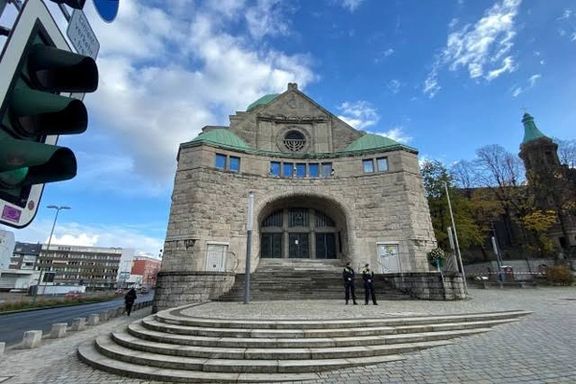
A court in Germany has levied accusations against an individual in connection with a fire that occurred in November 2022 at a school in the city of Bochum.

A court in Germany has levied accusations against an individual in connection with a fire that occurred in November 2022 at a school in the city of Bochum.
The defendant is alleged to have received directives from the Iranian government, with the primary target being a synagogue situated adjacent to the school.
The 36-year-old defendant, a dual Iranian-German citizen, is set to face trial on September 12th in the regional high court of Dusseldorf, as indicated by the official indictment. He has been charged with orchestrating an arson attack under the orders of Iranian government authorities, targeting a synagogue in the Ruhr region of western Germany.
Court documents reveal that the accused made unsuccessful attempts to recruit an acquaintance as an accomplice in executing the attack plan, with the acquaintance subsequently reporting the matter to law enforcement authorities.
The incident, which happened in mid-November, resulted in only minor damage. Since that time, the accused has remained in custody.
Prior to these developments, German media had referred to the accused as Babak J. and linked him to an earlier synagogue attack in the city of Essen, in November. Reports indicated that he had also been planning a third attack on a synagogue in Dortmund, where he was eventually apprehended.
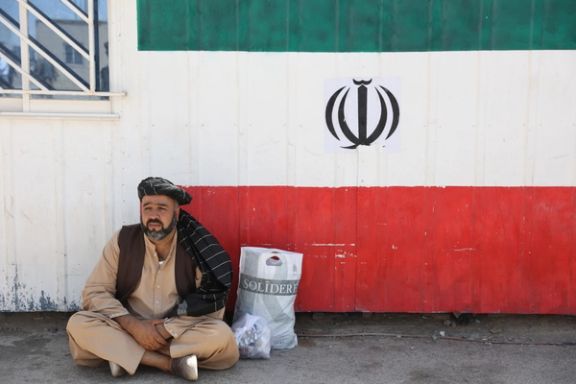
Media in Tehran are increasingly sounding alarms about the rapid growth of the Afghan population in Iran, which is estimated to be between five to ten million now.
The conservative Jomhuri Eslami reported last week that unofficial statistics indicate that last fall out of 300 babies born at the hospital of Kavar, a small town near Shiraz, capital of southern Fars province, 297 belonged to Afghan families.
According to the newspaper, which is one of the Islamic Republic’s oldest, the latest statistics also show that the number of Afghans in the province has risen to 357,000 from 121,000 since the Taliban took over the Afghan government in August 2021.
Officials say hundreds of Afghans are entering Iran daily from the eastern borders. Less than one million Afghans in Iran have refugee status, and most of the rest are illegal immigrants.
“Security officials must concerned that the presence of so many foreign nationals will entail many threats [to national security],” Jomhuri Eslami wrote. Iranian authorities and some media usually refer to Afghan immigrants and refugees as “foreign nationals.”
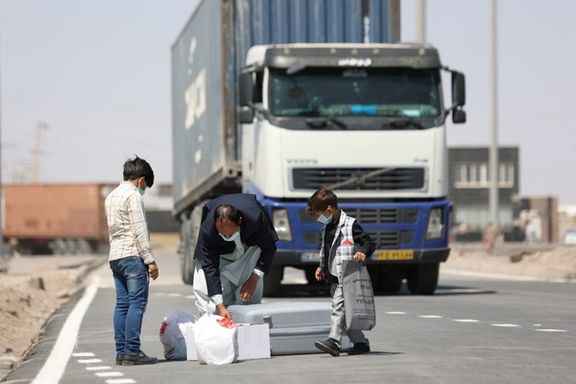
The article, extensively republished by other newspapers and websites, also referred to the involvement of two Afghan national in an attack on Shahcheragh shrine and mausoleum in Shiraz on October 26, 2022. Both men were publicly hanged on July 8.
In an unattributed commentary in July, Aftab News, a news website close to former President Hassan Rouhani and the moderate conservative Moderation and Development Party, also warned about what appears to be a massive increase in the number of Afghans in Iran and claimed that authorities are actively encouraging the growth of the Afghan population.
Aftab News alleged that factors such as a lack of control at eastern borders of the country, issuing thousands of tourist visas daily when applicants do not intend to return to their home country, automatic renewal of tourist, pilgrimage and other types of visas, elimination or reduction of cash fines for illegal entry and stay, indicate “targeted planning” by the authorities.
This may refer to some hardliner media openly promoting acceptance of more Afghans in Iran to increase the country’s population as a solution to the falling birth rate among Iranians when the Revolutionary Guards (IRGC)linked Tasnim news agency suggested in 2022.
Iran's population growth rate has dropped to around 0.7 percent in the past few years.
“Acceptance of immigrants can be one of the key solutions to overcome the problem of [dwindling] population and workforce given the drop in the fertility rate in the country,” Tasnim said in an unattributed commentary entitled “Iran Forced to Accept Immigration of Foreign [Nationals] to Resolve Its [Dwindling] Population Problem” on May 19, 2020.
“The closeness of beliefs and culture of neighboring countries, particularly Afghanistan, has provided an extraordinary opportunity to Iran in this regard,” the commentary said, presumably with an eye to accepting more Afghan Hazaras who are Shiites like Iranians.
Hazaras make up the biggest ethnic group among Afghan immigrants to Iran followed by Sunni Tajiks, Pashtuns and Uzbeks.
Supreme Leader Ali Khamenei has repeatedly stressed that the country’s population should rise to at least 150 million, presumably to strengthen the only Shiite-ruled Muslim state.
Faraz Daily, an online newspaper, reported last week that there are now transportation companies that move commercial consignments and belongings of Afghan household to Tehran within a week from Kabul and Herat.
This, the newspaper argued “has been causing concerns in Iran because the illegal residence of these immigrants, in the absence of laws and policies to regulate their presence, will lead to numerous political, social and even security challenges,” Faraz Daily wrote.
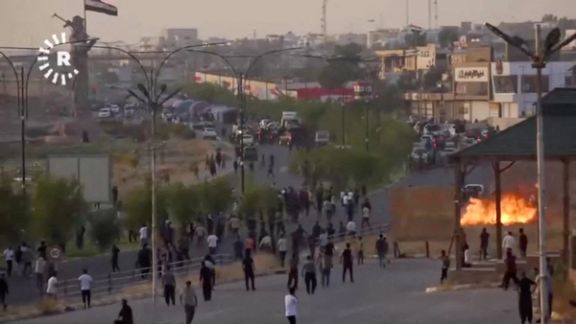
Ethnic tensions between Kurds and Arabs are simmering in Syria and Iraq with reports that Iran is sowing further discord to weaken dissident Kurdish forces.
AN uprising by Arab tribes against the Kurds is reportedly backed by Tehran proxy militias as well as Turkish forces, targeting different Kurdish groups across the region, with oil-rich provinces of Deir ez-Zor (Deir al Zor) in Syria and Kirkuk in Iraq as hotbeds of clashes.
Iran’s Foreign Minister Hossein Amir-Abdollahian met with his Turkish counterpart, Hakan Fidan, in Tehran, where they stressed the need for further security cooperation.
During their joint presser, Fidan called on Syria’s government to bolster cooperation against the PKK, emphasizing that the group is designated a terrorist outfit by the US and Europe as well as Turkey.
Amir-Abdollahian, in his turn, said the sovereignty and territorial integrity of nations should be respected, calling for collaborations among Tehran, Ankara, and Damascus regarding issues related to terrorism and border security. Without going into details, he praised Fidan’s “constructive ideas regarding the common borders and counterterrorism efforts.”
US-based journalist Diliman Abdulkader said Kurds are targeted on all fronts this week, with bombing in Iraqi Kurdistan’s Erbil, bloody protests in Kirkuk and rise of the Arab tribes in Kurdish-controlled northern Syria.
On Sunday, Reuters reported that senior US officials visited Syria's eastern Deir ez-Zor province in an attempt to defuse the uprising by Arab tribes against Kurdish rule that is destabilizing northeast Syria. According to US State Department, Deputy Assistant Secretary of State for Syria Ethan Goldrich and Major General Joel B Vowell, who heads the coalition against Islamic State, met Arab tribal leaders and SDF commanders and agreed to "address local grievances" and "de-escalate violence as soon as possible and avoid casualties."
The Arab tribal backlash against the rule of the Kurdish YPG militia has led to clashes, with over 150 killed and dozens injured in the past several weeks. The militia forms the backbone of the US-backed Syrian Democratic Forces (SDF), and the uprising is the biggest threat to their rule since they drove Islamic State (ISIS) out of a swathe of the country's north and east in 2019.
Foreign policy analyst Walid Phares said on X (formerly known as twitter) that the clashes between the SDF and Arab Sunni tribes in Deir ez-Zor "have been instigated by Iranian intelligence,” claiming that “the Islamic Republic and the Muslim Brotherhood militias are collaborating to weaken and reduce the SDF control in eastern Syria” aimed at "crippling US presence.” According to Phares, Turkish drones are also providing air support to the Muslim Brotherhood militias attacking SDF positions in Northern Syria.
Hussain Abdul-Hussain, a research fellow at the Foundation for Defense of Democracies, said Monday that the Iranian regime is preparing “to subdue US Kurdish allies in Iraqi Kurdistan” as “regime’s pawn in Lebanon Hezbollah is preparing to engage in violence” against US Druze friends in southern Syria.
Several cities in southwestern Syria are also scenes of protests for economic reform and curbing Iran's influence. Protesters, demanding an end to President Bashar al-Assad's authoritarian rule, earlier closed the ruling Baath party headquarters in Sweida, a southwestern Syrian Druze city. Iran intervened in the Syrian civil war as early as 2011 to defeat a rebellion against Assad. Now, having built a large military presence there, Iran is using Syria to expand its regional reach and pose a threat to Israel's northern borders.
The involvement of the pro-Iran militias also has another dimension. Late in August, Iran and Iraq formalized an agreement to dismantle Iranian Kurdish dissident factions stationed in the northern reaches of Iraq and relocate them from their bases. These dissident factions in Iraq have aligned their allegiances with the two principal Iraqi Kurdish parties: the Kurdistan Democratic Party, headquartered in Erbil, and the Patriotic Union of Kurdistan party, with its stronghold in Suleimaniyah.
The arrest of a renegade Arab commander last month by the SDF sparked unrest that soon swept a string of towns from Busayrah to Shuhail, in a strategic oil belt in the heart of Arab tribal territory east of the Euphrates River. Arab tribal fighters initially drove out the Kurdish-led forces from several large towns, but the SDF has begun to regain the upper hand.
The presence of the US military in regions under the control of the SDF has acted as a deterrent against the expansion of militias supported by Russia and Iran, who have established a foothold in territories to the west of the Euphrates River.
SDF has accused Tehran and the Damascus of sending tribal militias to wreak havoc in the northeast of Syria.
Arab tribal leaders say they have been deprived of the oil wealth in their region after the Kurdish-led forces gained control over Syria's largest oil reserves following the departure of the Islamic State. "We want them out of all of Deir ez-Zor, we want the administration of the area in the hands of the original Arab inhabitants," said Sheikh Mahmoud al Jarallah, a tribal leader.
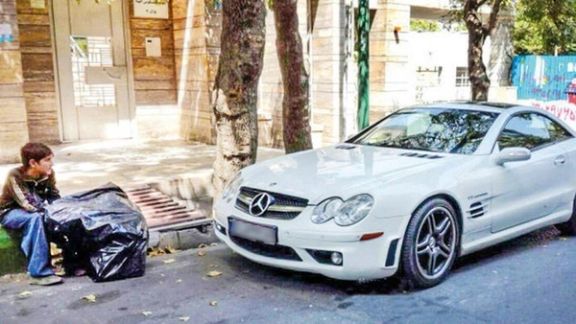
With one in three Iranians living in absolute poverty, a renowned economist has said authorities are using statistics in a power struggle instead of solving the problem.
Farshad Momeni, a professor at a Tehran university, highlighted the distressing reality of widespread poverty, as per recent official data analysis but warns that some government officials are misusing and manipulating the data in the name of justice.
“This has given rise to a situation where individuals assert their ability to eradicate absolute poverty within 14 days, while others escalate these assertions, leading to a disconcerting competition among segments of the power structure to outdo one another with baseless statements,” he said.
He also pointed to a dramatic decline in middle-income levels over recent years, which has narrowed the gap between those living above and below the poverty threshold.
In Iran, the "poverty line" signifies the income threshold necessary to meet a household's essential needs, with incomes falling below this mark labeled as "absolute poverty." Iranian authorities report that the poverty line for Tehran residents stands at around 300,000,000 rials (approximately $600) per month, which is three times the country's minimum wage.
However, figures alone are not enough to grasp the complexities of the poverty landscape, Momeni said. He argued that it is essential to grasp the dynamics of development to appreciate the precarious position of the middle-income class and reiterated that using the stark statistics to gain popularity in government would do little to help the actual problem.
In a society grappling with these challenging realities, the economist's candid and sobering analysis serves as a wake-up call, emphasizing the urgent need for comprehensive and informed policy responses to address the multifaceted issue of poverty in Iran.

An exclusive report by the IranWire website reveals that undercover judicial officials posed as referees for international boxing events to report back to the regime.
Citing information from an intelligence source within the Ministry of Sports and Youth, IranWire disclosed that Abolfazl Ameri Shahrabi, the Deputy Prosecutor of Arak, and Majid Abbaszadeh, a member of the intelligence organization of the Joint Chiefs of Staff, were sent abroad to boxing event under the guise of international referees.
According to the report, Ameri Shahrabi's involvement in the world of boxing dates back to his participation in the national boxing team's camps between 1995 and 1998. He transitioned into refereeing the sport during the early 2010s. The report further revealed ongoing discussions about the potential transfer of Ameri Shahrabi to Tehran to assume a new position in one of Tehran's sensitive judicial centers.
Ameri Shahrabi is the same judicial official who filed charges against Sadrollah Fazeli Zarei and Yousef Mehrdad, who were executed in May 2023on accusations of blasphemy and insulting religious and Islamic sanctities on social media.
On a related note, Majid Abbaszadeh, a boxing referee and a member of the intelligence protection organization of the Joint Chiefs of Staff of the Armed Forces, assumed the position of the head of the Tehran Boxing Association in July of this year.
This disclosure of the overseas travels of these two individuals with judicial and intelligence affiliations to European and American countries comes at a time when Western nations have imposed sanctions on numerous officials of the Islamic Republic.

A Swedish citizen, part of the EU diplomatic corps, has been covertly detained in Iran for over 500 days as part of Iran's hostage diplomacy, reports The New York Times.
Johan Floderus, 33, who worked for the European Union's diplomatic corps, was arrested at Tehran airport in April 2022 as he prepared to depart the country after what was described as a private tourist trip with friends.
In July 2022, the Iranian government released a statement announcing that it had apprehended a Swedish national for espionage who was being held in Evin prison, however they did not disclose any further details.
The New York Times spoke to six individuals with first-hand knowledge of the case, who all confirmed that Floderus’ had nothing to do with any espionage claims.
The Swedish Ministry for Foreign Affairs said it would not comment on the details of the case, citing a need for secrecy. “A Swedish citizen — a man in his 30s — was detained in Iran in April 2022,” its press department said in a recent email. “The Ministry for Foreign Affairs and the Embassy of Sweden in Tehran are working on the case intensively.”
“We understand that there is interest in this matter, but in our assessment, it would complicate the handling of the case if the ministry were to publicly discuss its actions,” it added.
Floderus was detained when EU diplomats were hard at workto broker a nuclear deal between Iran and the United States. Two top EU foreign policy officials visited Tehran in mid-2022, while they kept his detention hidden from the public and European institutions. It is not clear to what extent the fact that one of their employees was held hostage impacted their mediating role.
Hannah Neuman, a German member of the European Parliament commented on the case on social media saying that parliament should have been informed about Floderus’ arrest, as well as attempts to secure his release and the impact on JCPOA negotiations.
She directly criticized the EU's policy of keeping Floderus’ arrest and detainment a secret as it may impact attempts to revive nuclear diplomacy. Others called for a policy re-think. “A serious recalibration of policy is needed,” said Kasra Aarabi, an academic, who took to social media to comment on the case. He further demanded the proscription of the IRGC and consolidated international action against the Iranian regime.
The European External Action Service, the diplomatic service for which Floderus works confirmed that they have been following the case very closely and that his arrest “underlines the very concerning tendency of Iranians to use EU nationals or Iranian dual nationals as pawns for political reasons." However, neither Swedish nor EU authorities have publicly discussed the situation, citing the need for confidentiality.
“This case has also to be seen in the context of the growing number of arbitrary detentions involving EU citizens,” added Nabila Massrali, a spokeswoman for the EU bloc’s diplomatic body. “We have used and will continue to use every opportunity to raise the issue with the Iranian authorities to obtain the release of all arbitrarily detained EU citizens.”
The arrest of Floderus follows a pattern of Iran detaining dual nationals and foreigners on dubious charges to use them as bargaining chips for prisoner exchanges or to extract concessions and funds.
A recent deal saw five American prisoners being released in return for freeing up $6bn of frozen Iranian funds in South Korea, which puts an approximate price of $1.2bn per head.
Relations between Iran and Sweden have soured recently, notably with the sentencing of a former senior Iranian judicial official, Hamid Nouri, to life in prison in Sweden for war crimes committed in Iran. Iran has escalated pressure on Sweden in response.






